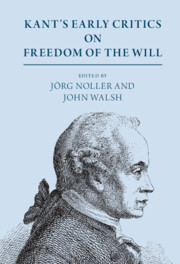
-
Select format
-
- Publisher:
- Cambridge University Press
- Publication date:
- March 2022
- March 2022
- ISBN:
- 9781108687720
- 9781108482462
- 9781108729673
- Dimensions:
- (229 x 152 mm)
- Weight & Pages:
- 0.672kg, 290 Pages
- Dimensions:
- (229 x 152 mm)
- Weight & Pages:
- 0.54kg, 363 Pages
- Subjects:
- Eighteenth-Century Philosophy, Philosophy
- Collection:
- Other Cambridge Editions
You may already have access via personal or institutional login- Subjects:
- Eighteenth-Century Philosophy, Philosophy
- Collection:
- Other Cambridge Editions
Book description
This book offers translations of early critical reactions to Kant's account of free will. Spanning the years 1784-1800, the translations make available, for the first time in English, works by little-known thinkers including Pistorius, Ulrich, Heydenreich, Creuzer and others, as well as familiar figures including Reinhold, Fichte and Schelling. Together they are a testimony to the intense debates surrounding the reception of Kant's account of free will in the 1780s and 1790s, and throw into relief the controversies concerning the coherence of Kant's concept of transcendental freedom, the possibility of reconciling freedom with determinism, the relation between free will and moral imputation, and other arguments central to Kant's view. The volume also includes a helpful introduction, a glossary of key terms and biographical details of the critics, and will provide a valuable foundation for further research on free will in post-Kantian philosophy.
Reviews
‘This is a fine collection that will help students and scholars understand the intricacies of Kant's multifaceted theory of freedom. When we see how Kant's own contemporaries debated some of the same interpretive and philosophical issues that we debate today, we get insight into the enduring appeal of Kant's approach. No philosopher before or since offered an examination of freedom as complicated and yet rewarding as Kant's, and here we can see his own contemporaries clashing over what Kant meant and how we humans are or are not free.'
Frederick Rauscher - Michigan State University
‘This volume deserves a place on the shelf of every serious scholar and student of Kant.’
Dai Heide Source: Journal of the History of Philosophy
Contents
Metrics
Altmetric attention score
Full text views
Full text views help Loading metrics...
Loading metrics...
* Views captured on Cambridge Core between #date#. This data will be updated every 24 hours.
Usage data cannot currently be displayed.
Accessibility standard: Unknown
Why this information is here
This section outlines the accessibility features of this content - including support for screen readers, full keyboard navigation and high-contrast display options. This may not be relevant for you.
Accessibility Information
Accessibility compliance for the PDF of this book is currently unknown and may be updated in the future.


